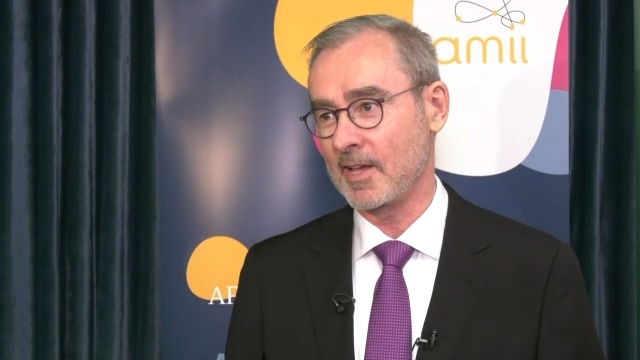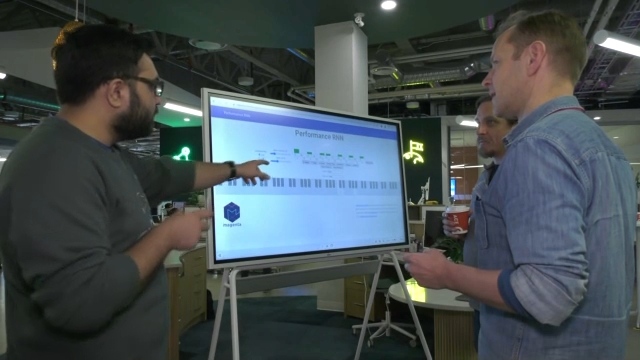$30M Amii investment into AI an 'enormous step forward' for research
A $30-million injection into the Alberta Machine Intelligence Institute (Amii) will help recruit top artificial intelligence talent to Edmonton to drive research and technology development with the University of Alberta.
On Tuesday, Amii announced the new funding — to be provided over five years by the Canadian Institute for Advanced Research — will support hiring 20 new AI research chairs and extending funding for four existing faculty members.
Those chairs will look to increase technological understanding of current AI applications, connect research with industry and develop new research to advance the field, U of A president Bill Flanagan explained.
"Adding these AI chairs will boost our global reputation for research excellence and continue to signal to Canada and the world that we are uniquely positioned to tackle some of the world's most pressing challenges," Flanagan said.
The university will focus on employing AI professionals specializing in health, energy, and Indigenous initiatives for health and humanities.
 University of Alberta President Bill Flanagan speaks with reporters on Tuesday, Jan. 31, 2023 (CTV News Edmonton/Matt Marsall).
University of Alberta President Bill Flanagan speaks with reporters on Tuesday, Jan. 31, 2023 (CTV News Edmonton/Matt Marsall).
'THE BEST IS YET TO COME'
Cam Linke, Amii CEO, told reporters 11 key researchers had spearheaded AI research over the past decade, so adding another 20 people represents another "enormous step forward" for Edmonton and the province.
AI can be applied to any field because of its endless potential to predict challenges, develop problem modelling and optimize existing processes, Linke said.
While AI is already a powerful tool, Linke says, "the best is yet to come."
"It's still growing like crazy," he added. "That's why we are continuing to invest in research in the area. There's new opportunities and impacts every day."
Amii is already working with more than 100 companies to bridge research the university conducts with companies seeking innovative solutions, Linke said.
- U of A integrating artificial intelligence into exoskeleton technology
- New laser microfabrication suite at U of A offers researchers sharper lab equipment
 Amii bridges AI research with industry experience to promote the technology in various real-world applications (CTV News Edmonton/Matt Marshall).
Amii bridges AI research with industry experience to promote the technology in various real-world applications (CTV News Edmonton/Matt Marshall).
Osmar Zaiane, U of A computing science professor and Amii research fellow, is working on a project to detect diabetes using retinal images.
"Many of the amazing AI techniques are black boxes. So they are very accurate; they can tell you, for example, this patient has this cancer or whatever, even better than humans," Zaiane shared.
"But when you ask it, 'Why did you make that decision?' It's a black box. It doesn't tell you why. It's just accurate, and that's it.
"We are working on making these black boxes explainable," he added.
- Distracted driving cameras being tested in Edmonton
- 'Absolutely priceless': Alberta rancher using facial recognition, phone app to monitor cows
Derek MacKenzie is a soil scientist and associate professor in the U of A's Faculty of Agricultural Life Environmental Sciences. He is collaborating with data scientists to glean insights from historical soil data to inform future management practices.
"Artificial intelligence is really useful in seeing patterns. Because we have such a large data set, it's not easy for humans to see patterns and relationships," MacKenzie said.
"It's much easier for a computer to do that," he added. "We are trying to tap into artificial intelligence to see patterns in that or long-term trends… to help us predict output in the future."
For Flanagan, AI's ability to break the boundaries between disciplines and generate new improvements is why it is a key focus for the university.
"It's absolutely extraordinary," he said. "It's a field that applies across the board, and it is expanding our capacity in research in really an exponential fashion.
"It's hard for us to even imagine the impact that it will have on all of our lives in the next 10 to 20 years."
With files from CTV News Edmonton's Marek Tkach
CTVNews.ca Top Stories

King Charles III focuses Christmas message on healthcare workers in year marked by royal illnesses
King Charles III used his annual Christmas message Wednesday to hail the selflessness of those who have cared for him and the Princess of Wales this year, after both were diagnosed with cancer.
Azerbaijani airliner crashes in Kazakhstan, killing 38 with 29 survivors, officials say
An Azerbaijani airliner with 67 people onboard crashed Wednesday near the Kazakhstani city of Aktau, killing 38 people and leaving 29 survivors, a Kazakh official said.
Second storm incoming for Christmas Day in southern B.C.
Environment Canada has issued a new series of weather warnings for British Columbia’s south coast Christmas morning.
Pope urges 'all people of all nations' to silence arms and overcome divisions in Christmas address
Pope Francis in his traditional Christmas message on Wednesday urged 'all people of all nations' to find courage during this Holy Year 'to silence the sounds of arms and overcome divisions' plaguing the world, from the Middle East to Ukraine, Africa to Asia.
What is Christmas like for Quebec health-care workers who stay on the job?
Most Quebecers get together with family and friends on Christmas Eve, but many professions require people to remain on the job at all times, including health-care workers.
Mother-daughter duo pursuing university dreams at the same time
For one University of Windsor student, what is typically a chance to gain independence from her parents has become a chance to spend more time with her biggest cheerleader — her mom.
Read Trudeau's Christmas message
Prime Minister Justin Trudeau issued his Christmas message on Tuesday. Here is his message in full.
Man dead, woman in hospital after overnight housefire in Scarborough
An elderly man has died after being pulled from a two-alarm house fire in Scarborough Christmas morning.
A look back and ahead at the stories making news in men's hockey
Connor McDavid was in tears. The Edmonton Oilers had given everything they could in a hard-fought Stanley Cup final against the Florida Panthers.
































